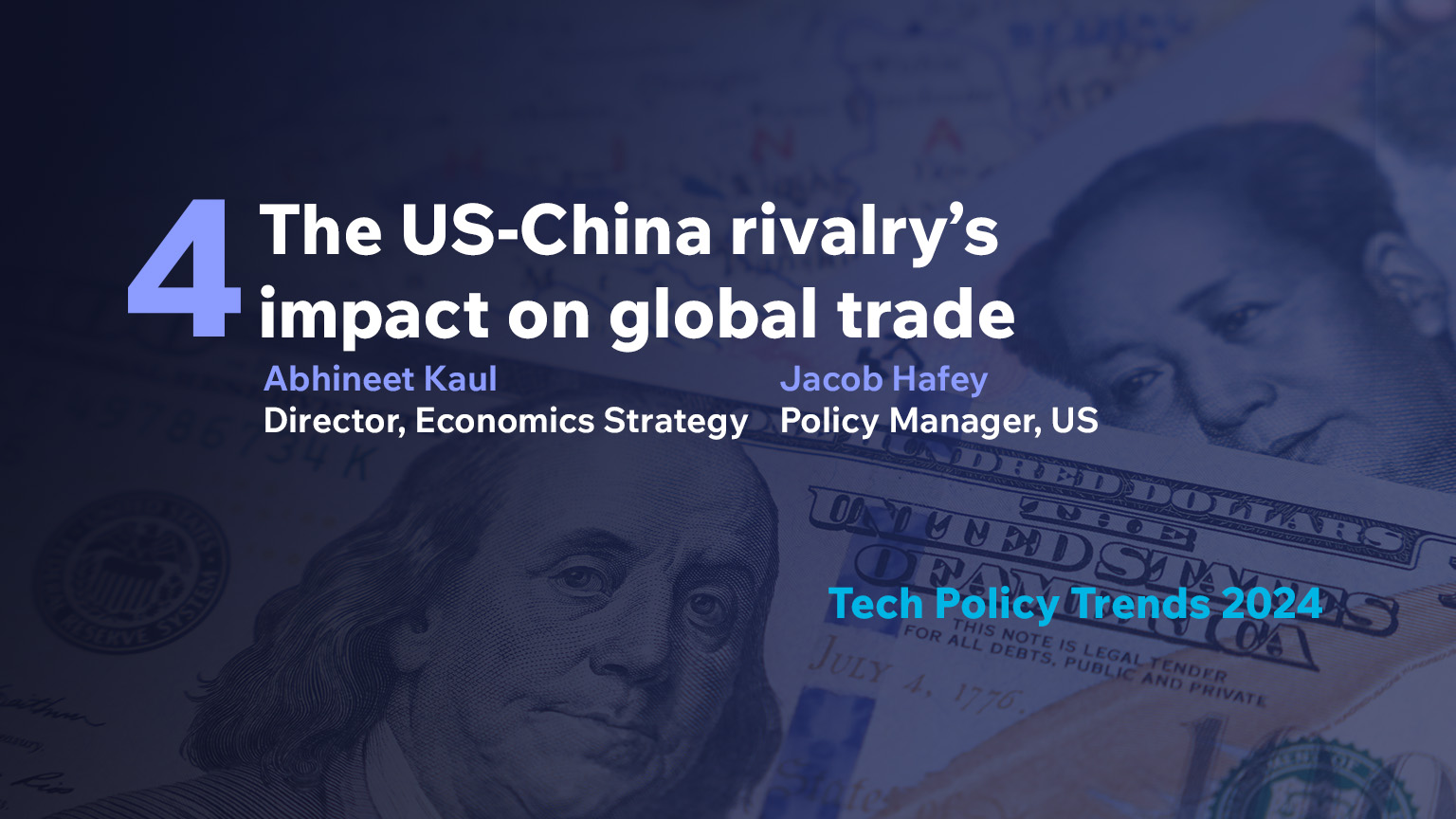

Abhineet Kaul
Economics Strategy


Jacob Hafey
Artificial Intelligence
With a presidential election less than 12 months away, political positioning in the US will have global ramifications. China, meanwhile, is navigating its own domestic concerns. How will the countries caught in the middle navigate the resulting turbulence?
The relationship between the US and China has been characterised by a complex interplay of cooperation and competition. Since introducing export controls on advanced semiconductors and semiconductor manufacturing equipment (SME) in October 2022, the Biden Administration has redoubled its efforts to restrict China’s access to the world’s most advanced chips through close coordination with countries including Japan and the Netherlands, both of which released their own semiconductor export controls in 2023. The increased attention received by AI and machine learning technologies this year also opened a new dimension to bilateral tensions, culminating in an Executive Order restricting US investment in China’s semiconductor and AI sectors in August and an expansion of the 2022 export controls in October aimed at limiting Beijing’s access to AI chips.
Maintaining a competitive edge over China is one of the increasingly few areas of US policy that receives consistent bipartisan support. Going into an election year, the rhetoric surrounding China from both parties will become more aggressive, with the Biden Administration set to further expand its semiconductor and SME export restrictions by October 2024 at the latest. In July, the Bureau of Industry and Security solicited opinions on potential rule changes targeting cloud computing, noting how certain Infrastructure as a Service (IaaS) functions have been used to circumvent its existing licensing regime.[1] The US will further expand its export controls on advanced semiconductors, potentially targeting cloud computing infrastructure used to circumvent existing restrictions.
China has responded to the actions of the US by introducing its own export regulations on rare earth resources frequently used in high-tech products. China produces approximately 60% of the world’s germanium products, 80% of gallium, and refines 90% of the global supply of graphite. It has imposed licensing restrictions on the export of the first two (used in chipmaking processes) and requires export permits for the latter[2] (used in the manufacturing of batteries and fuel cells). In November, the Ministry of Commerce issued a notice requiring exporters to report transactions of over 70 additional rare earth minerals and oxide products.[3] While China has largely continued to facilitate scoped exports under a presumption of approval, future escalations of trade restrictions by the US or others can be expected to prompt the Chinese government to clamp down further on rare earth exports.
However, China is facing several sources of economic uncertainty, including a slump in the property market, high municipal debt levels, and slowing economic growth. In response, the Chinese government has taken steps this year to encourage foreign investment, such as seeking to ease requirements on crossborder data flows and providing tax incentives to “high and new technology enterprises”.[4] In 2024, it will be these economic challenges, and the trade balances with global trading partners, that will shape how China responds to further US trade sanctions more than any other factor.
The increasingly narrow avenues of bilateral engagement will further push China towards regions such as Latin America, the Middle East, and Africa, where it has benefitted from taking a “no strings attached” approach to aid and investment. Despite the trade restrictions mentioned above, China has remained the largest trading partner[5] of countries including Brazil, Argentina, Saudi Arabia, Egypt, South Africa, and Nigeria. Chinese telecom company Huawei, which has been subject to US export controls since 2017, remains[6] one of the largest providers of 5G equipment for Brazil and Mexico. Rather than acquiesce to demands from the US regarding transparency, IP protection, and human rights guarantees, China will deepen its engagement with non-Western countries and encourage domestic research and development endeavours to enhance its self-reliance. As a result, the US and China will competitively seek to deepen their engagement with non-Western countries, both bilaterally as well as through multilateral arenas such as the I2U2 group, the IndoPacific Economic Framework (IPEF), the Belt and Road Forum, and the Regional Comprehensive Economic Partnership (RCEP).
The trade tensions between the US and China have contributed to an increasingly complex regulatory environment for companies with global supply chains, especially those with significant business operations in the two countries. For governments and businesses in emerging markets, this will entail re-evaluating their dependence on their key partners, with a focus on maximising the opportunities while still balancing their relationship with the US and China. Countries in the Global South, such as Mexico, India, Vietnam, Indonesia, and Poland, have sought to capitalise[7] on this trend. For example, Mexico recently overtook[8] China as the US’s largest trade partner. Another notable example is the plan by Apple[9] to expand its investment in India to approximately USD 40 billion over the next four to five years. As a result, governments and businesses will focus on supply chain resilience,[10] building more flexibility and redundancy into their operations and pivoting from “just-in-time” to “justin-case” models. At the same time, investing in geographical diversification for production is now considered a means of managing risk.
Every year, Access Partnership’s Tech Policy Trends report leverages our global expertise and relationships with leading stakeholders across the public and private sectors to bring you the defining issues of the next 12 months.
From to the future of internet governance and consumer protection to mega-constellations and the implications of the G20 in Brazil, stay one step ahead of the headlines in 2024 by downloading the full report.




